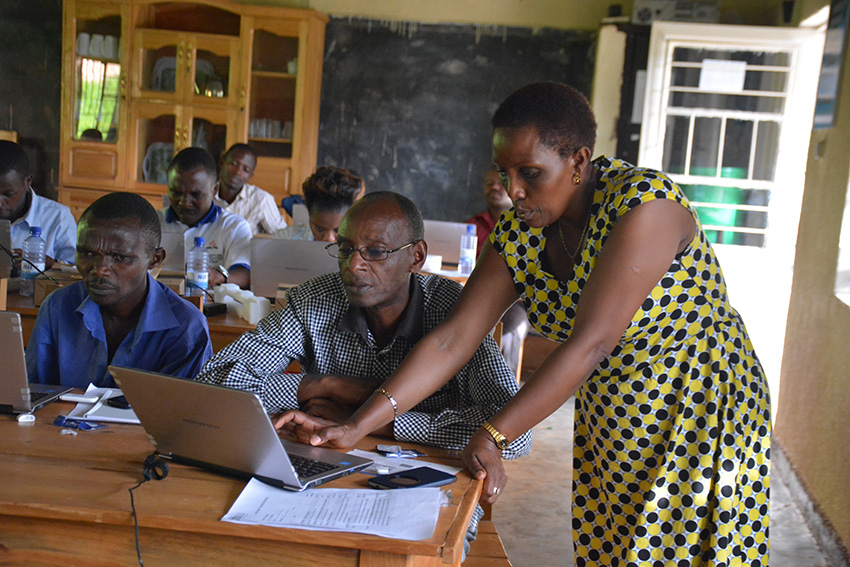
Photo Credit: FHI 360/USAID Rwanda
To support ongoing efforts to improve education in Rwanda, the Mentorship Community of Practice project launched in 2013. Funded by the U.S. Agency for International Development (USAID) and led by FHI 360, this project developed an online community of practice that promotes peer learning and sharing of resources; provides access to education resources through an e-library; and helps mentors get support from each other, the Rwanda Education Board and other education programs.
As a result of the project’s success, USAID decided to expand access to teachers in the Rwanda Education Board’s school-based mentor initiative and to focus on early grade reading in a new program called the Teachers Community of Practice (TCOP), which will be introduced as part of USAID’s Early Grade Reading project launch in February 2017.
Literacy expert Chantal Uwiragiye talks about the program’s innovations, successes and key learnings.
There are many early grade reading projects in Rwanda. What makes the Teachers Community of Practice unique?
The program employs information and communication technology (known as ICT) to support and connect teachers, mentors and partners in education. The program’s web portal is used by more than 1,000 school-based mentorship programs. Through this portal, visitors can:
- Share ideas
- Have access to an e-library that centralizes all resources from current and past education programs in early grade reading, including a best practices guide
- Discuss education topics, particularly instruction in early grade reading
One of the most popular offerings on the site is “Meet the Expert.” During these live sessions, mentors and teachers ask experts questions and discuss a variety of topics. There are also face-to-face trainings on topics such as the basics of ICT and best practices in literacy.
Another new contribution, in collaboration with the University of Rwanda College of Education and the Rwanda Education Board, is the first accredited web-based course on the foundations of reading instruction. Through this course, registered teachers and mentors can get in-depth training on effective reading instruction in Kinyarwanda (one of the three official languages of Rwanda).
How is the web-based course preparing teachers to improve literacy outcomes, and how is the mentorship community ensuring that the course is sustainable?
Rwanda’s Education Sector Strategic Plan 2013–2018 prioritizes the acquisition of literacy skills among Rwandan primary and secondary school students. The web-based course will equip all lower primary Kinyarwanda teachers with best practices for instruction in early grade reading. The course will be delivered through four modules: 1) the importance of reading and mother tongue, 2) the components of reading and writing, 3) building a culture of reading in school, and 4) effective literacy leadership from parents and communities. Teachers can practice what they learn from the course in the classroom and share their experiences with course mates through the program’s forums.
Trainings on the web-based course are showing significant increases in the number of mentors who have reported having solid knowledge about how to use program resources and who feel more confident in their ability to support teachers in early grade reading instruction.
To ensure that progress is sustained, the course will be hosted on a platform managed by the Rwanda Education Board. I will work closely with lecturers from the University of Rwanda to develop and moderate the course. In addition, the program has trained these lecturers on instructional design.
What are some important program outcomes that will inform future programming and help other practitioners?
Participants appreciated and applied ideas they learned from peers and felt that the program removed barriers to participation by allowing them to engage with mentors on a daily basis. Outcomes included building their personal technological skills, especially in the use of the portal, and receiving technical support for internet issues. And, because the program monitors the community of practice on a daily basis, users’ inquiries are answered quickly, and the program can track what users find challenging and what works well.
The highly interactive forum has led not only to learning among mentors and teachers, but also among the mentorship community and its partners. Through this interaction, the mentorship community has improved the navigability of the portal and developed more engaging offerings, such as the “Meet the Expert” live sessions.
